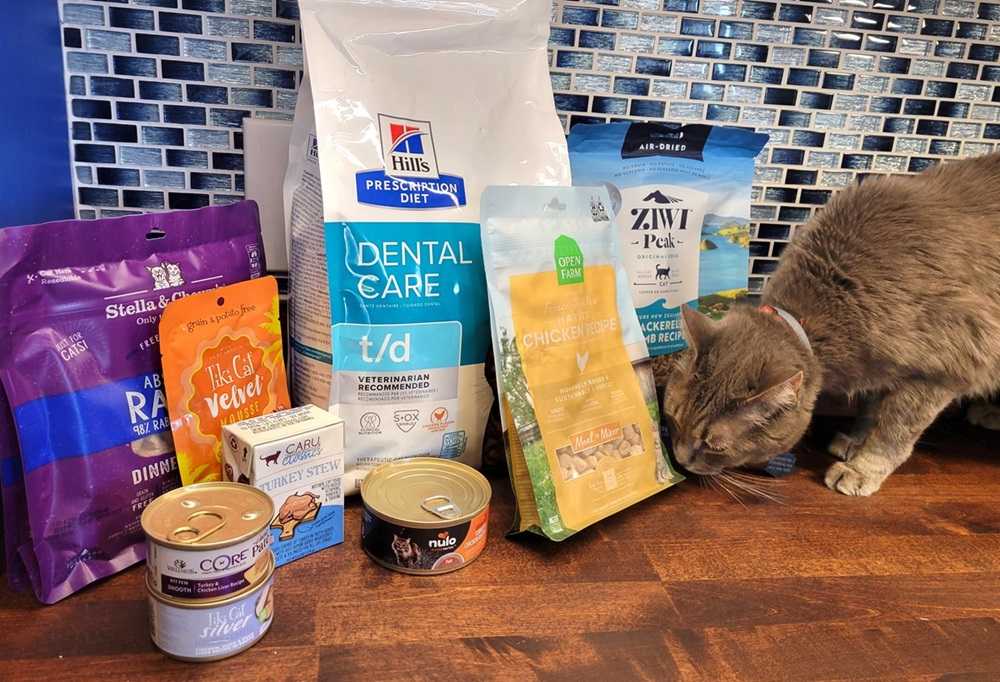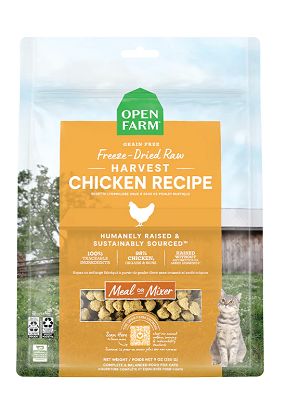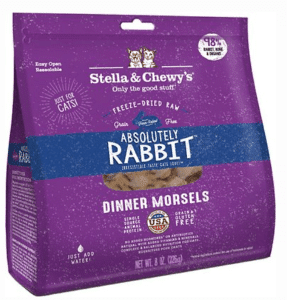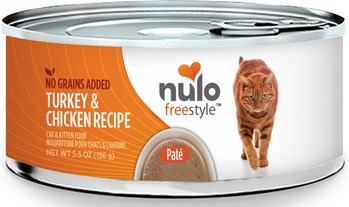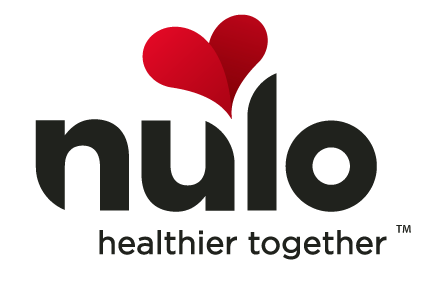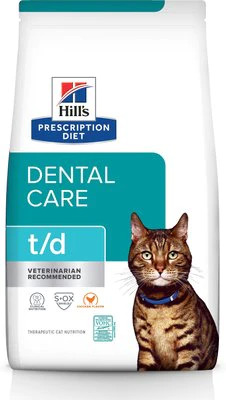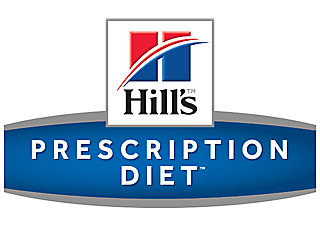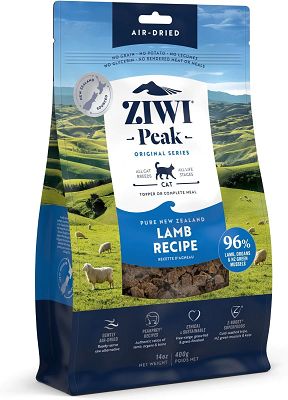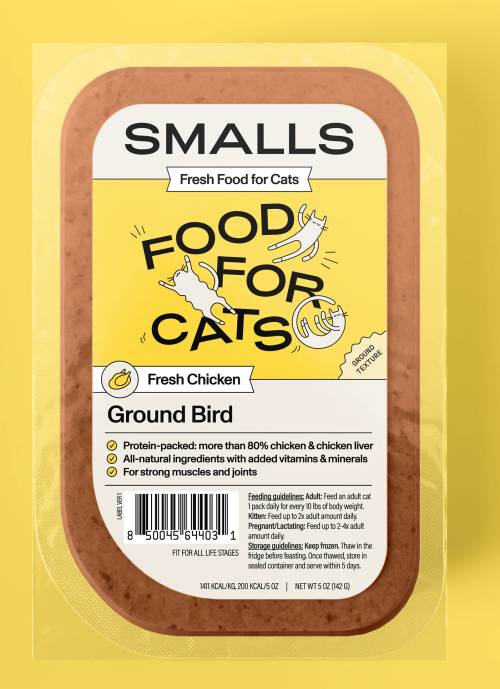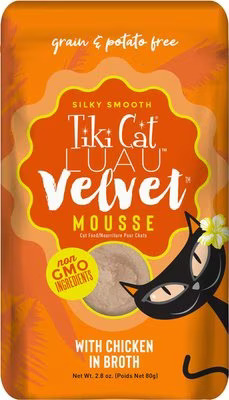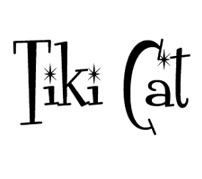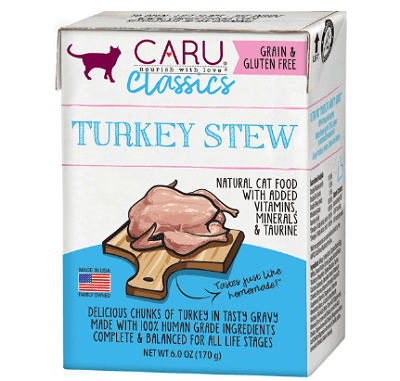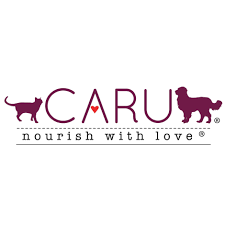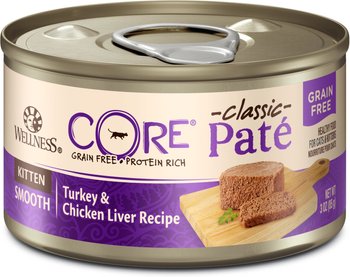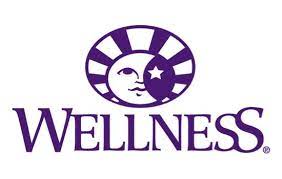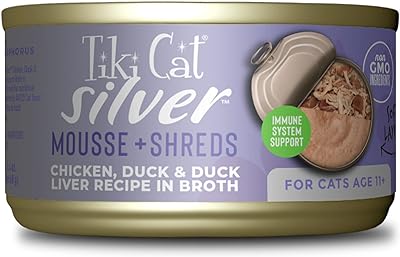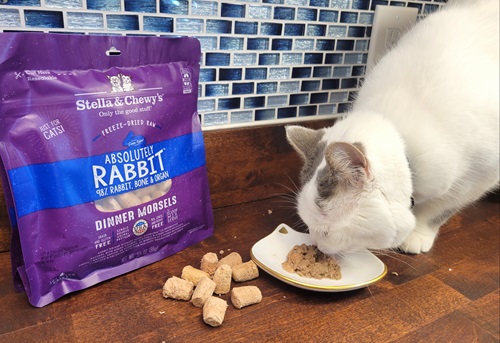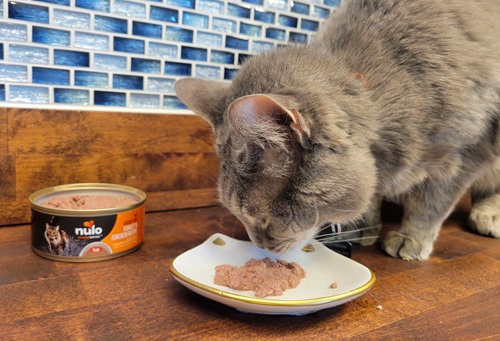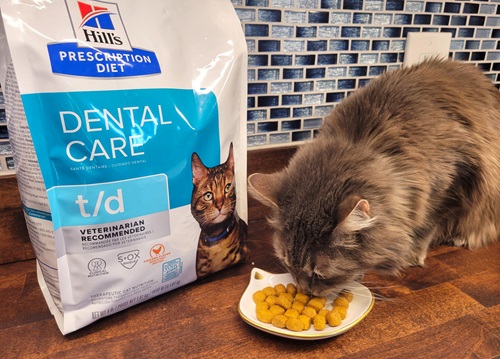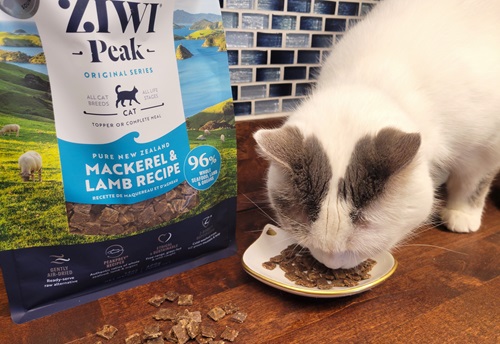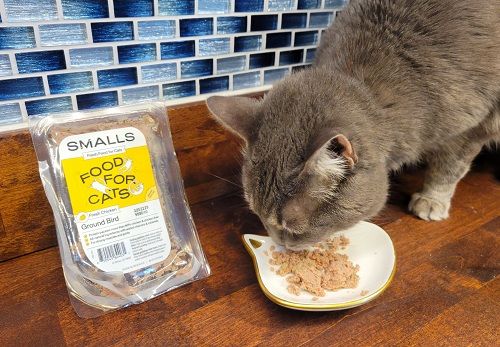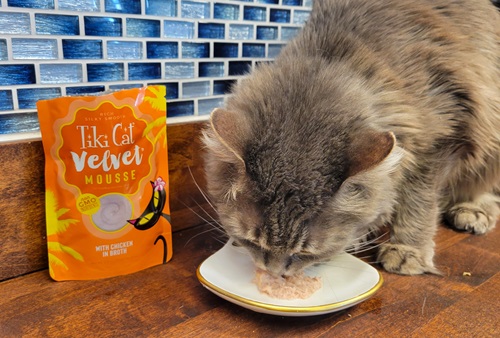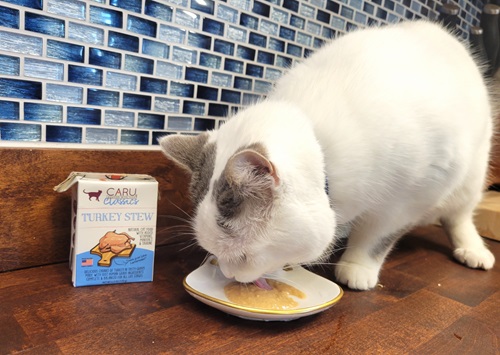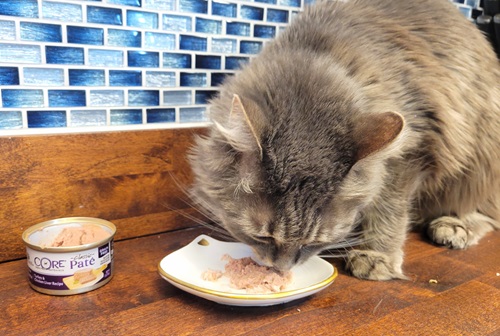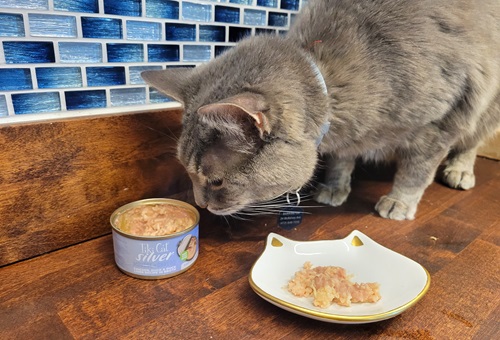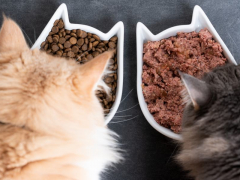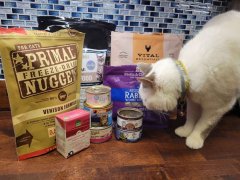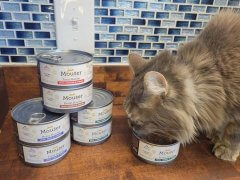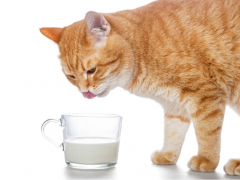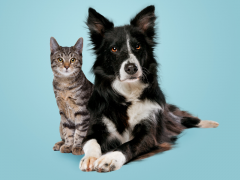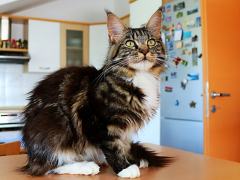Kate Barrington / Cats.com
Dental disease in cats is incredibly common—affecting as many as 90% of cats over the age of three. Cat food alone cannot prevent or cure your cat’s dental disease, but diet is an important piece of the puzzle. Dental disease is known to be very painful and progressive, so it’s important to seek veterinary advice if your cat shows any signs of mouth problems.
I have three cats, all seniors now, and two have undergone extractions due to tooth resorption. Though the cause of this particular form of dental disease is unknown, experts suggest that, by supporting overall health, proper nutrition may help protect your cat’s oral health as well.
In this guide, we’ll discuss the topic of feline dental health from a nutrition perspective and provide vet-approved recommendations to help you protect your cat’s teeth.
At a Glance: Top 10 Best Cat Food for Dental Health
Open Farm Harvest Chicken Freeze-Dried Raw Cat Food
- Rich in animal-sourced protein and fat
- Very low carbohydrate content
- Rehydrated texture is easy to chew
Stella & Chewy’s Absolutely Rabbit Dinner Morsels Freeze-Dried Raw Cat Food
- Made with 98% rabbit meat, organs, and bone
- Easy to rehydrate in water or broth
- Meaty texture is easy to chew
Nulo Freestyle Turkey & Chicken Recipe Wet Cat Food
- Contains 50% dry matter protein
- Smooth pate texture is easy to chew
- Rich in hydrating moisture
Hill’s Prescription Diet t/d Dental Care Chicken Flavor Dry Cat Food
- VOHC-accepted for plaque and tartar control
- Large kibbles encourage chewing
- Appealing chicken flavor
Ziwi Peak Air-Dried Mackerel and Lamb Recipe Cat Food
- Made with 96% whole seafood, lamb, and organs
- Contains over 50% dry matter protein
- Novel protein formula
Smalls Ground Bird Fresh Cat Food
- Fresh cat food delivered to your door
- Made with a single protein source
- Multiple flavors and textures available
Tiki Cat Luau Velvet Mousse with Chicken in Broth Grain-Free Wet Cat Food
- Smooth mousse doesn’t require chewing
- Rich in animal-sourced protein
- Good source of hydrating moisture
Caru Classics Turkey Stew Wet Cat Food
- Flavor appeals to many cats
- Very smooth texture
- Rich in hydrating moisture
Wellness CORE Kitten Turkey & Chicken Liver Recipe Canned Cat Food
- Soft pate texture is easy to eat
- Rich in animal-sourced protein and fats
- Good source of DHA for kittens
Tiki Cat Silver Mousse + Shreds Chicken, Duck & Duck Liver Recipe in Broth
- Dual texture is easy to chew
- Rich source of hydrating moisture
- Relies primarily on animal protein
Can Cat Food Solve Dental Health Problems?
If you don’t spend much time examining your cat’s teeth, you’re not alone. In fact, Dr. Amber Carter, DVM, DABVP, a board-certified Feline Practice veterinarian and the owner of CatVetLife, comments that “dental disease commonly goes unnoticed by cat owners until there is significant bad breath or problems chewing.”
My cats’ teeth always looked clean enough, but I knew something was wrong when Bagel started flinching if I touched her jawline. It turned out that several of her teeth were damaged enough to require extraction. She’s now a few teeth short of a full set but happily pain-free.
Also Read: Best Dental Cat Treats
I asked Dr. Carter whether a particular type of food is best for a cat’s teeth. She says that the canned food versus dry food discussion has pros and cons on both sides. Crunching on kibble could have an abrasive effect that gently scrapes away the plaque on cats’ teeth, but most cats swallow their food whole. There’s simply no solid evidence that a dry food diet alone provides more significant dental benefits than other diets.
“For a cat with significant dental disease,” Dr. Carter says, “wet food is easier to chew while awaiting appropriate dental care.” And if your cat has already been diagnosed with dental disease or has had teeth extractions, soft food is likely to be easiest on their mouth. She also notes that canned cat food has many other benefits outside of oral health.
The bottom line is there is no “best” cat food for dental health. Dr. Carter says, “The best diet for any given cat is the one that the owner and veterinarian have chosen for that specific cat and their overall health needs.”
Best Cat Foods for Dental Disease
When it comes to protecting your cat’s dental health, there’s no substitute for daily toothbrushing and routine oral exams. If your cat finds eating or chewing painful, it’s important to seek veterinary advice. And if your cat has existing dental problems, they’ll need a veterinary assessment and treatment plan. That said, a balanced diet that supports your cat’s overall health will benefit their dental health as well.
Certain types of food may be more comfortable for cats with existing dental problems to eat. Cats with painful mouths may avoid certain foods or lose their appetites, so softer foods can help them enjoy their meals more. Your veterinarian can advise you on your cat’s specific needs, but we’ve assembled a list of nutritionally balanced foods for cats of all ages, with unique preferences, and in different stages of dental disease.
Why Trust Cats.com
Before choosing products to test for this round-up, I consulted several veterinarians and board-certified veterinary nutritionists on the subject of dental health in cats. I also conducted in-depth research, utilizing professional resources like the Merck Veterinary Manual, to gain a deeper understanding of the diagnosis, treatment, and prevention of feline dental disease.
Guided by my research and veterinary advice, I selected ten cat food products for testing. I personally purchased these products and tested them at home with my three cats: Bagel, Munchkin, and Biscuit. In testing, I observed the products and gauged my cats’ responses to them. I also performed in-depth analyses of each product’s nutritional information, reviewed the brand’s history, and read hundreds of customer reviews.
What To Look for When Buying Cat Food for Dental Health
When their cat is first diagnosed with dental disease, many cat owners turn to prescription dental diets. Dr. Jamie Wittenburg, DVM, notes that while these diets “have been scientifically proven to reduce plaque and tartar on cats’ teeth”, they’re not always nutritionally ideal. In some cases, she recommends feeding cats a small amount of a prescription dental diet each day, “almost akin to brushing their teeth.”
Keeping any specific advice from your veterinarian in mind, here are some things to consider when shopping for a healthy diet for cats with dental concerns.
Look for Low Carbohydrate Content
The ideal diet for cats is meat-based with limited carbohydrate content. Dr. Whittenburg notes that dry cat food is typically higher in carbohydrates (and more calorically dense) than wet food. Look for a formula made primarily with animal-sourced proteins and fats, ideally aiming for a dry-matter carbohydrate content under 10%.
Prioritize High-Moisture Recipes
Hydration is essential for your cat’s overall health but high-moisture foods also tend to be easier for cats with dental health concerns to eat. If your cat experiences dental pain, look for a smooth, pate-style food or even a mousse.
Verify Marketing Claims
Claims on cat food labels can be confusing and they aren’t always backed by scientific data. Dr. Whittenburg recommends that cat owners consult their veterinarian or a board-certified veterinary nutritionist for advice before selecting a cat food product that claims to provide specific health benefits. If your vet recommends a dental diet, look for a seal from the Veterinary Oral Health Council to verify the claim.
Dr. Carter notes that prescription dental diets are “most likely to be effective on a mouth that is clean to begin with.” In other words, they may be most beneficial for cats who have undergone a professional dental cleaning.
Frequently Asked Questions
Do dental foods work for cats?
The theory behind many dry dental cat foods is that the crushed kibble will remove plaque and tartar as it rubs against the cat’s teeth. Because cats tend to swallow dry food whole instead of chewing, however, they may not benefit from this abrasive action. Diets with large kibble pieces may be more effective at encouraging good chewing action.
How can I improve my cat’s dental hygiene?
Daily toothbrushing is the best way to improve and protect your cat’s oral health. For cats who are resistant to brushing, oral hygiene rinses or water additives can be a convenient alternative, as can certain cat treats approved by the VOHC. Even with proper daily care, many cats require professional dental cleanings once in a while.
